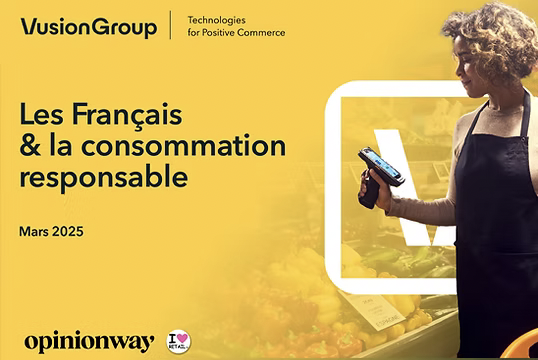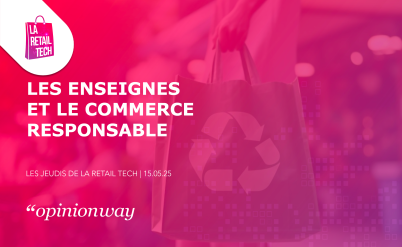News

The French and responsible consumption
30 March 2025
Studies
The French are ready to act, but at what price?
Exclusive OpinionWay survey for VusionGroup
IN BRIEF :
STRONG AWARENESS AND COMMITMENT...
- 77% of French people consider themselves responsible consumers, including 13% who are "completely" responsible.
- 98% say they are ready to make at least one effort towards more environmentally-friendly consumption.
- The three most cited commitments: accept less packaging on deliveries (91%), recycle electronic devices (89%), repair rather than buy a new device (86%).
... BUTLIMITED BY PRICE
- On average, the French are prepared to accept an increase of 10.5% for "Made in France" products, 9.7% for local products and 7.1% for organic products.
- Food-related products, such as seasonal products (9.3%) and those respecting animal welfare (8.9%), attract a greater financial effort than non-food products.
PRICE, THE N°1 CRITERION IN CONSUMER CHOICES FOR 3 OUT OF 4 FRENCH PEOPLE
- 75% of French people rank price as their main purchasing criterion, regardless of age or monthly income.
- This is followed by product composition (47%), and the use-by date of food products (43%), tied with product shelf life.
- By contrast, only 59% are prepared to pay more for environmentally-friendly products. This budgetary constraint reflects a constant trade-off between commitment and affordability.
RESPONSIBLE PURCHASING BEHAVIOUR VARIES ACCORDING TO PRODUCT TYPE
Food products: ethical consumption on the rise
- 66% buy seasonal produce at least once a week.
- 53% prefer local products, 47% Made in France.
- When faced with a constraining choice, 57% prefer to buy local products, even those from intensive farming, ratherthan organic but imported.
Non-food products: more fragmented adoption
- 24% buy easily recyclable products at least once a week.
- 21% prefer products with low environmental impact.
- Only 10% buy second-hand products at least once a week, and 26% never do.
TOO FEW RESPONSIBLE PRODUCTS ON OFFER
- 55% of French people feel that the range of environmentally-friendly products on offer (local, organic, anti-waste, second life, eco-friendly, etc.) is insufficient in stores and e-commerce sites.
- Organic products (64%), seasonal products (60%) and products with a Nutri-score A or B (59%) are perceived as having a sufficient offer.
- Faced with the absence of an eco-responsible product, the French are divided: 28% prefer toforego their purchase, while 28% buy a less environmentally-friendly substitute.
- The French identify three priorities for stores and e-commerce sites in the face of climate change: improving energy efficiency (66%), offering more local and national products (47%), and reducing packaging (40%).
Read the full study here.





